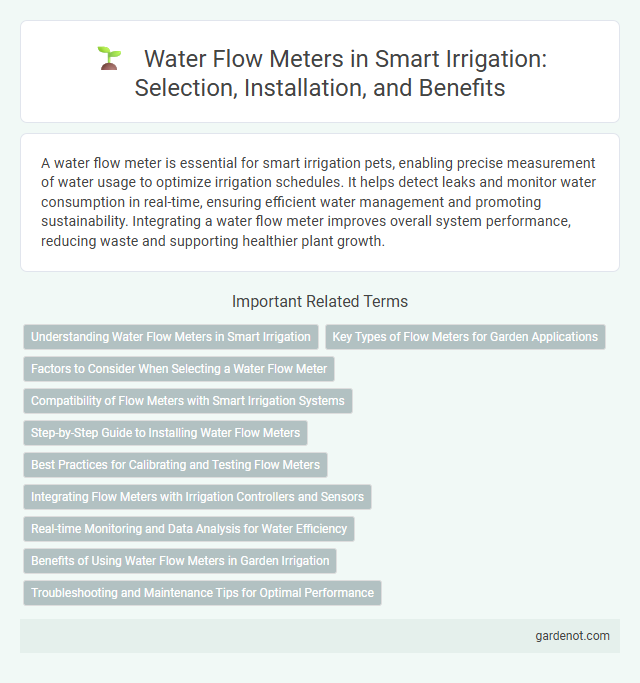A water flow meter is essential for smart irrigation pets, enabling precise measurement of water usage to optimize irrigation schedules. It helps detect leaks and monitor water consumption in real-time, ensuring efficient water management and promoting sustainability. Integrating a water flow meter improves overall system performance, reducing waste and supporting healthier plant growth.
Understanding Water Flow Meters in Smart Irrigation
Water flow meters play a critical role in smart irrigation by precisely measuring the volume and rate of water delivered to crops, enabling efficient water management and reducing waste. These devices use technologies such as ultrasonic, electromagnetic, or mechanical sensors to monitor real-time water flow data, facilitating accurate irrigation scheduling and leak detection. Integrating water flow meters with IoT systems enhances automation and data-driven decision making, optimizing water usage and supporting sustainable agricultural practices.
Key Types of Flow Meters for Garden Applications
Electromagnetic flow meters provide precise, non-intrusive water measurement ideal for smart irrigation systems due to their accuracy and lack of moving parts. Ultrasonic flow meters use sound waves to measure flow rates, offering a maintenance-free and durable solution for garden water management. Mechanical turbine meters, although less common, are cost-effective for small-scale garden irrigation, providing reliable flow readings through internal rotor rotations.
Factors to Consider When Selecting a Water Flow Meter
Selecting a water flow meter for smart irrigation requires evaluating accuracy, as precise measurement ensures optimal water usage and reduces waste. Consider the compatibility with different pipe materials and sizes to guarantee seamless integration within existing irrigation systems. Durability and resistance to environmental factors like corrosion and debris are essential for long-term reliability and minimal maintenance.
Compatibility of Flow Meters with Smart Irrigation Systems
Water flow meters designed for smart irrigation systems must offer seamless integration with automated controllers and real-time monitoring platforms to optimize water usage efficiently. Compatibility with common communication protocols such as Modbus, LoRaWAN, and Zigbee ensures accurate data transmission and remote control capabilities. Selecting flow meters that support these standards enhances system reliability and promotes sustainable water management practices.
Step-by-Step Guide to Installing Water Flow Meters
Installing a water flow meter for smart irrigation involves first selecting the appropriate meter type based on pipe size and water pressure. Next, turn off the water supply, cut the pipe where the meter will be installed, and securely fit the meter using compatible connectors to ensure a leak-free seal. Finally, calibrate the meter according to manufacturer instructions to accurately monitor water flow and optimize irrigation scheduling.
Best Practices for Calibrating and Testing Flow Meters
Calibrating water flow meters in smart irrigation systems involves using a known volume of water to verify meter accuracy, ensuring reliable data for efficient water management. Testing procedures should include regular zero-flow checks and comparison against reference meters under varying flow rates to detect sensor drift or mechanical wear. Consistent calibration intervals and documenting results enhance system performance and prevent over- or under-irrigation, optimizing water conservation efforts.
Integrating Flow Meters with Irrigation Controllers and Sensors
Integrating water flow meters with irrigation controllers and sensors enables precise monitoring and management of water usage, reducing waste and improving efficiency. These systems collect real-time data on water flow rate, allowing automated adjustments based on soil moisture levels and weather conditions. Accurate flow measurement supports early leak detection and ensures optimal irrigation schedules, enhancing crop health and conserving resources.
Real-time Monitoring and Data Analysis for Water Efficiency
Water flow meters provide real-time monitoring of irrigation systems by accurately measuring water usage, enabling precise control over water distribution. Advanced data analysis from flow meters helps identify leaks, optimize watering schedules, and reduce water waste, improving overall irrigation efficiency. Integrating smart sensors with flow meters enhances data-driven decisions, promoting sustainable water management in agriculture.
Benefits of Using Water Flow Meters in Garden Irrigation
Water flow meters in garden irrigation provide precise measurement of water usage, enabling efficient water conservation and reducing wastage. These devices help detect leaks and system malfunctions early, preventing damage and costly repairs. Accurate flow data supports optimized irrigation scheduling, promoting healthier plant growth and lower water bills.
Troubleshooting and Maintenance Tips for Optimal Performance
Regular calibration and inspection of the water flow meter are essential to ensure accurate readings and prevent system inefficiencies in smart irrigation. Check for blockages, leaks, and sensor damage periodically to maintain optimal performance and avoid water wastage. Implementing routine cleaning and timely replacement of worn parts enhances the longevity and reliability of the flow meter within irrigation systems.
Water flow meter Infographic

 gardenot.com
gardenot.com